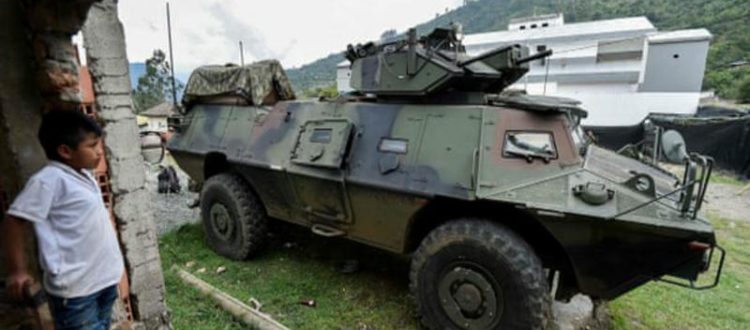Colombia launches military offensive after killing of five indigenous leaders
Colombia’s government has launched a military offensive to hunt down the gunmen responsible for the massacre of five indigenous leaders in the south-western province of Cauca.
The president, Iván Duque, travelled to the region on Wednesday along with his defence and interior ministers to condemn the massacre and oversee operations to root out armed groups that plague the conflict-ridden Cauca province.
The government blamed dissident factions of the Revolutionary Armed Forces of Colombia (or Farc), a now-demobilised leftist rebel group, for the attack on Tuesday, in which assailants threw grenades and opened fire on a convoy of armoured SUVs carrying the indigenous leaders.
Among the victims was Cristina Bautista, the leader of the semi-autonomous Tacueyó reservation and her unarmed indigenous guardsmen. Six other people were wounded in the aftermath, as the attackers fired on an ambulance that arrived at the scene.
An initial investigation suggested that the massacre came in response to the capture of three Farc dissidents by local indigenous guardsmen.
“Clearly, here we have a longstanding threat of drug trafficking groups, and of dissidents, who want to intimidate the population,” Duque told reporters from the nearby town Santander de Quilichao. “I hope to make some important announcements about operational capacity in the region and the capacity we will have to face these threats.”
But his words rang hollow with indigenous leaders across the country who say he has done little to combat threats and attacks that have persisted since the Farc demobilised following a peace accord signed in 2016.
“The government says the right things, but doesn’t do anything,” said Eduin Marcelo Capaz, the human rights coordinator of a local indigenous council. “Duque will say whatever he has to to cover up his government’s ineffectiveness and disinterest in protecting us.”
“When will the massacre end?” tweeted the National Indigenous Organization of Colombia (or Onic), going on to report that 121 indigenous people have been murdered since Duque took office in August last year.
Opposition politicians also lambasted the government’s inaction. “What is under way in Colombia is an indigenous genocide, and it will not stop if international justice does not appear,” Senator Gustavo Petro tweeted on Tuesday night, as news of the massacre began to spread.
Violence is a daily reality in the Cauca province, where last month mayoral candidate Karina García was murdered with three others on the campaign trail ahead of elections that took place last Sunday.
The violence that marred the election campaign – six other candidates were murdered nationwide – reminded Colombians of the political violence of the 1990s and 2000s, when the Farc were at their most powerful.
The 2016 peace deal was supposed to usher in a new chapter of tranquility, formally ending half a century of civil war that killed 260,000 and forced over 7 million from their homes.
“The region where this massacre took place is a first-tier zone for violence, and the defence sector surely knows this but the response to repeated calls for help from indigenous communities has been far from adequate,” said Adam Isacson, a security analyst at the Washington Office on Latin America, a thinktank.
“People are being left unprotected by their government in an area that is being disputed among several armed and criminal groups,” Isacson added. “Colombia must prioritise protecting these communities, working with their leaderships, to prevent another horrible tragedy.”
But while the Farc demobilization removed one faction from Colombia’s war, peace never truly arrived: local conflicts over the drug trade, land rights and mineral resources continue to fuel violence, and social and indigenous leaders are often targets.
Imagen: Luis Robayo/AFP.
According to Colombia’s human rights ombudsman, 486 activists and human rights defenders have been murdered since January 2016, alarming watchdogs.

